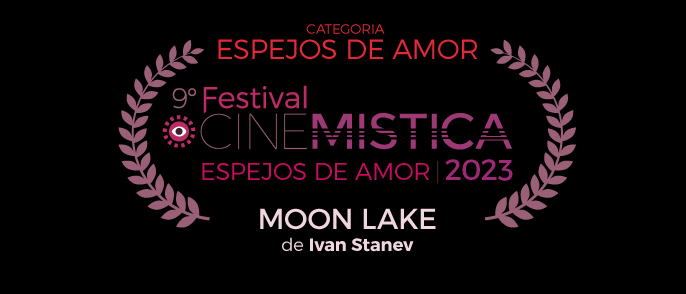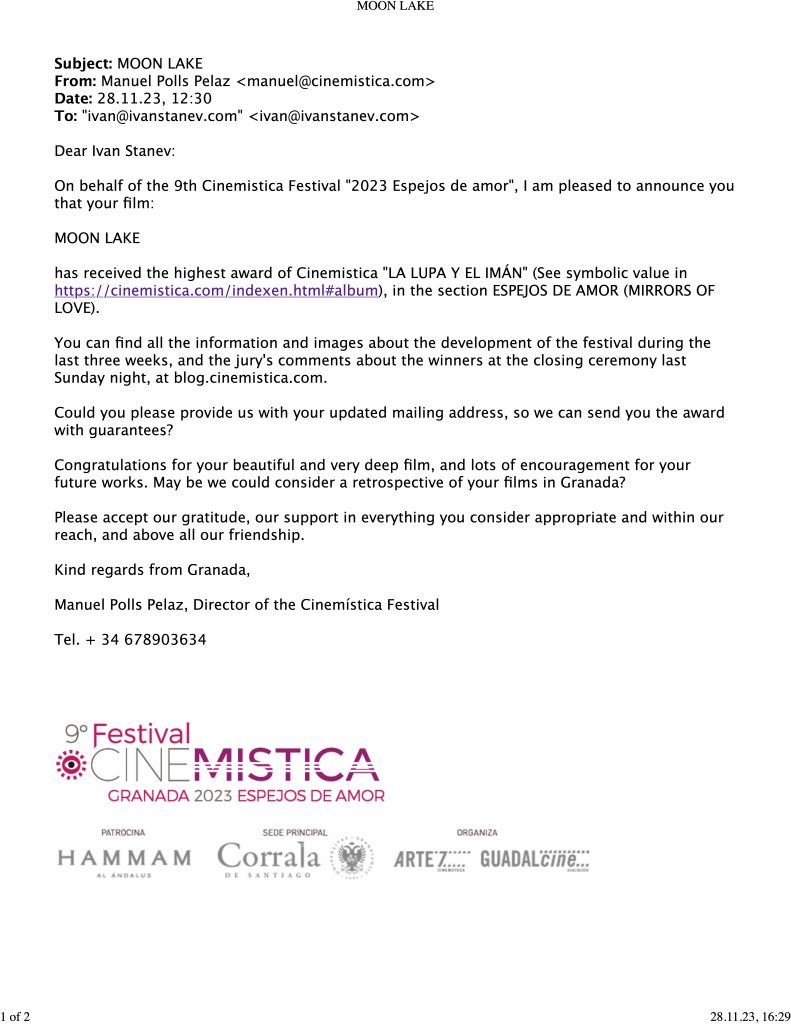Moon Lake === CInemistica Award


Moon Lake in Granada
Cinemistica Film Festival
Love Mirrors | Espejos de amor

Viernes 10 Noviembre
CORRALA DE SANTIAGO
19:30H
FILMS A CONCURSO
- 2023 ESPEJOS DE AMOR: Films sobre el amor. El cinematógrafo como espejo de la fenomenología amorosa en el ser humano: Cada fotograma, cada secuencia, cada sonido y cada silencio, pueden potencialmente generar amor en los espectadores, independientemente del tema tratado, con estilo narrativo o no narrativo.
Amor con minúsculas y con mayúsculas. Existe una distancia infinita entre la palabra Amor y los fenómenos amorosos en el contexto experiencial de lo que solemos llamar realidad. Es precisamente esa distancia, en ocasiones sencilla y diáfana, pero en otras de recorrido complejo, con anomalías, percances, rodeos y contradicciones, la que nos interesa.
Amor (y desamor) entre personas, amor hacia la vida, el arte, hacia el cinematógrafo, hacia la naturaleza, hacia los lugares y las cosas, amor hacia lo cotidiano y sus rituales, hacia lo excepcional, amor humanista, amor hacia la ciencia, hacia la historia, amores espirituales, literarios, culturales, amores concretos y abstractos, la ética en el amor, el amor en las religiones, evolución del concepto amoroso en la especie humana, amor y genética, amor y sociobiología, amor y panteísmo, projimización, el futuro del amor…
Cine amateur (hecho por amor al arte), industrial o pobre. En Cinemística no nos preocupan las circunstancias económicas de las películas, sino la ética interior y de producción en cada film.
Sostener un espejo frente a la naturaleza: En eso consistía para Orson Welles el oficio de director de cine: reflejar la naturaleza humana a través de una mirada. “¡Si no sabes nada de la naturaleza frente a la que sostienes el espejo, qué limitada debe resultar tu obra!” Y añadía: “Uno es el ángulo con el que se sostiene el espejo. Lo que finalmente resulta interesante no es el temblor romántico o el movimiento nervioso con el que se sostiene el espejo, sino la imagen que éste nos devuelve”.
Otro gran director de la historia del cinematógrafo, y gran amante de los espejos junto a su amigo Andréi Tarkovski, el inclasificable artista armenio Serguéi Paradzhánov, decía en 1977 al salir de una prisión soviética, por delitos políticos inexistentes: “Mi venganza será el amor!”. Nos permitimos comprenderlo en el sentido que en el cine, y tal vez también en la vida, no debe pretenderse impartir justicia, sino amor.
Amor y Cinemística.

* * *
The eyes are not here
There are no eyes here
In this valley of dying stars
In this hollow valley
This broken jaw of our lost kingdoms
T. S. Eliot, The Hollow Men
Thus Moon Lake is not a film “simply” about the end of the world, but a film about the way the world ends – about the mode of the world’s end. What mode is this? No, this is not the banal eschatological mode, not a catastrophic collapse of screams bloodsheds punishments retributions atonements revelations of infinite truths ecstasy – not the absolute end as an absolute event; it is a hushing un-happening un-event (pseudo-)normality of everyday life straying drifting decelerating losing stopping being unproductive – a drifting unproductive community with no clear goal, no leaders, not organized, not mobilized, not working, not creative.
The end of the world is a world – not, however, like some humanist myth of the beginning, of the golden age, of the ideal humanity in Eden – but as a world after the end of the world – the end of the world as a world – a world of the implacable, insatiable finiteness. No salvation. No dialectic ascent. No economy.
Yes, here, at this end of the world, the end of the world according to Moon Lake, amid the nostalgia and the hushing, an affirming, “optimistic” tone endures: the affirmation of an apocalyptic form of world. “May God grant everyone” such an end of the world. Only its enduring moment would draw us out of the global resignation of the world amidst the monstrous growth of the unworldly wasteland, the wasteland of swollen, atrophic newyorks, ejecting their venomous sperm into the pure darkness of the empty sky, the wasteland of the con-sumption of the world.
The end of the world is not only a punishment, retribution, or an exodus; it is not only a metamorphosis or an oeuvre, but it is active movement, wandering, wasting of the meaning in the void, unfocusing, focusing, resistance, struggle.
Apostasy, alteration, change.
Boyan Manchev – AFTER THE END OF THE WORLD